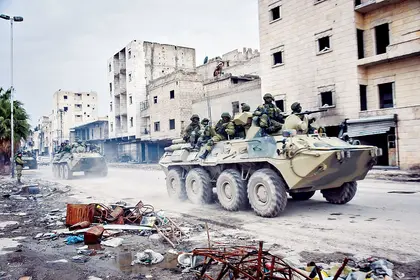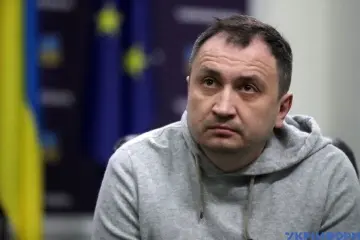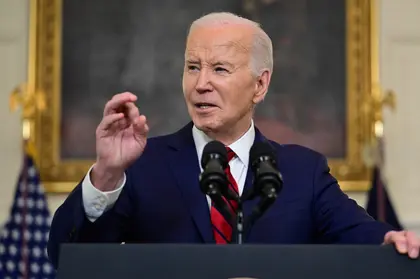Russia’s warmongering includes this military phenomenon: the extensive involvement of mercenary armies, illegal and secret, although fully backed by the Russian government.
Non-state military contractors — notably the notorious Wagner Group — are used to do the dirty work in the Kremlin’s wars.
Wagner, which emerged as a tool of Moscow in its war in Ukraine’s eastern Donbas in 2014, is still spilling blood in Syria. Its Russian sponsors get a cut from oil and gas production in the war-torn country, where at least 500,000 people have been killed since 2011.
And the practice has probably spread far beyond Syria and Ukraine. Ukrainian special services and analysts say that, starting from 2017, Wagner mercenaries have started to turn up in other hotspots around the world, particularly in Africa and the Arabian Peninsula.
The contracting by governments of private security companies to perform a wide range of operations, such as protecting cargo ships from pirates at sea, or safeguarding businesses, is not so new.
In 2012, according to the Economist news magazine, the global market of private security services was worth at least $100 billion, with the leaders being companies from the United States, Britain, Israel and Russia.
Lightly armed and closely regulated, dozens of major security companies are now being hired — mostly by Western governments — to assist their own armed forces during conflicts, in particular by relieving troops from various non-combat tasks, such as technical maintenance, training or providing security behind the lines.
But in its latest wars, the Kremlin has gone far beyond traditional security.
Clandestine army
According to the Security Service of Ukraine, or SBU, and numerous reports in global media, the Wagner Group formed in early 2014 as an offshoot of the Russian private security company “The Slavic Corps,” registered in Hong Kong.
After a failed short combat deployment in Syria, the corps returned to Russia in early 2014, but their fighters were detained on charges of being mercenaries — which is illegal in Russia. Nevertheless, one of its groups, led by former Russian special forces officer Dmitriy Utkin, who goes by the codename “Wagner,” was allowed to evolve into a full-fledged unofficial combat force that would have no formal connections with the Russian military or the Kremlin, but that would fight on its orders.
By late May 2014, the Wagner Group, with some 300 men, appeared in Ukraine’s Luhansk Oblast as Russia launched its war on Ukraine in the Donbas. The force, along with other Russian-led forces, participated in the battle of Luhansk Airport and Debaltseve between May 2014 and January 2015.
According to the SBU, it was Wagner mercenaries who downed a Ukrainian Il‑76 plane in June 2014 in the skies over Luhansk, killing all 49 Ukrainian soldiers on board.
Besides, as the agency said, Wagner was also responsible for high-profile assassinations of a number of Donbas militant warlords, such as Oleksandr Bednov (known as “Batman”) who had reportedly started to disobey the Kremlin’s orders.
In clashes with Ukrainian forces in Donbas, the Wagner group lost at least 35 fighters killed in action.
But Wagner’s effective combat record soon earned them a deployment to Syria, in August 2015, at least a month before the Russian military officially intervened in support of Syrian President Bashar al-Assad, in September.
Some 1,350 Wagner mercenaries joined pro-government forces fighting in the provinces of Latakia, Homs and Hama in the west of the country.
According to Russian media outlet Fontanka, as well as many other Russia resources, the mercenaries since 2015 have shared a home base with Russia’s 10th Special Forces Brigade near the village of Molkino in Krasnodar Oblast.
For its Syria mission, the Wagner Group quickly took on manpower among former Russian servicemen with a variety of specialist skills, as well as men with experience of fighting against the Ukrainian army in the Donbas.
As of early 2016, the group included at least four infantry companies augmented with tanks, artillery and rockets, and supported by an extensive logistics network.
“No private military company in whole the world has such a heavy firepower,” an SBU agent close to the service’s investigations into Wagner’s activities in the Donbas told the Kyiv Post on condition of anonymity, as he was not authorized to speak to the press.
“We’re absolutely sure that the Wagner Group is nothing but a Russian GRU military intelligence unit that, given its unofficial status, can be used as a highly effective combat force overseas, without the Kremlin or Russia’s official security and military agencies having any responsibilities for them.”
In general, according to the SBU, as many as 5,000 militants, mostly Russian citizens but including approximately 100 Ukrainian citizens, 20 Serbs, and 10 Belorussians, have served in Wagner for monthly pay of up to 300,000 Russian rubles ($4,800).
Besides, despite having no formal allegiance to the Russian army, Wagner commanders and combatants are awarded official military decorations, the official added.
For instance, on Dec. 9, 2016, all o the key Wagner commanders, including Dmitriy Utkin himself, were decorated by Russian President Vladimir Putin in the Kremlin. However, working as a mercenary in Russia, despite several attempts to legalize it, remains against the law.
Business interests
Starting from early 2016, Wagner’s attention focused on Syria’s oil-rich central and eastern provinces, particularly on the ancient city of Palmyra, then occupied by the Islamic State terror group, and also on the banks of the Euphrates River.
The reason was simple — the profitable gas and oil fields earlier captured and exploited by the Islamists had to be retaken.
The Russian media outlet RBK soon revealed in an investigation that the Wagner Group, which has never been officially registered, was directly financed by Evgeniy Prigozhin, a Saint Petersburg-based restaurateur and a highly trusted person from Putin’s inner circle — often referred to as “Putin’s chef” by Russian media.
Moreover, in late December 2017, the Associated Press news agency obtained a copy of a five-year contract between Evro Polis, a business structure owned by Prigozhin, and Syria’s state-owned oil and gas company General Petroleum Corp.
According to the contract, Prigozhin’s company would get “25 percent of the proceeds from oil and gas production at fields its contractors capture and secure from Islamic State militants,” the agency reported.
But the Kremlin’s shadow war for petroleum profits in Syria proved deadly for hundreds of Wagner fighters: On Feb. 7, 2018, Wagner forces suffered a devastating defeat at the hands of U.S. forces as they tried to capture a gas extractor near the city of Deir ez-Zor in eastern Syria.
In a four-hour battle later described as a massacre, Wagner lost at least 100 killed in action and more than 200 injured, according to the Reuters agency.
Beyond Syria
Starting from late 2017, new reports show that Wagner’s activity had expanded to other conflict zones around the world.
In January 2018, the U.S.-based private intelligence company Stratfor said that a number of Russian mercenaries had been deployed to Sudan to support the country’s president, Omar al-Bashir, in his war against the breakaway country of South Sudan.
Wagner’s new mission reportedly commenced after a meeting between Putin and al-Bashir in late December 2017, during which the Sudanese president asked for military assistance. According to Sergey Sukhankin, a fellow of the Jamestown Foundation, Wagner’s participation is to be paid for by the granting of a wide range of privileges to Russian businesses at Sudanese uranium and diamond mines.
Moreover, in late 2017, according to SBU intelligence sources, a number of Wagner militants were spotted fighting in Yemen, presumably on the side of the government forces, in that country’s civil war against a Shia uprising that started in 2014.
And according to Sukhankin, another group of Wagner mercenaries was deployed to the Central African Republic in early 2018 to support the local government amid long-running ethnic and sectarian violence in the country, and ensure privileged access for Russian businesses to the country’s resources.
You can also highlight the text and press Ctrl + Enter







Comments (0)